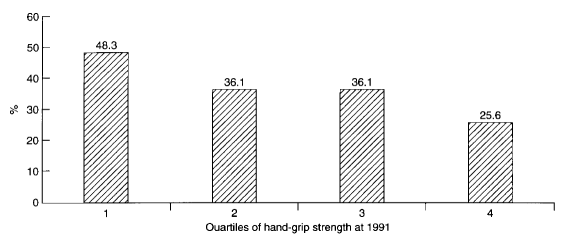Hand-grip strength related to lower disability
Hand-grip strength at baseline was inversely related to 4-year disability in rural elderly men in Italy. Of the men with a hand-grip strength rated “good”, 26% became disabled versus 48% who were graded “poor”. This inverse relationship of grip strength to risk of disability remained after multivariable analysis.

Interpretation
This small study among one SCS cohort shows that hand-grip strength in older men, a simple measure of muscular strength, provides information about the risk of future disability. Though hand-grip strength is influenced by several disorders, multivariable analysis showed that its prognostic value is independent of joint disorders, diabetes and cognitive function.
